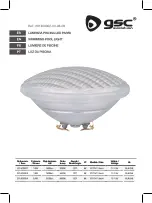
A. MOTOR WON’T START
1. Check for improper or loose connections, open
switches or relays, blown circuit breakers or fuses.
2. Manually check rotation of motor shaft for free
movement and lack of obstruction.
B. MOTOR CUTS OUT—Check for:
1. Wiring, loose connections, etc.
2. Low voltage at motor (frequently caused by
undersized wiring).
3. Binding and overload. (Amperage reading)
NOTE: Your Hayward pump motor is equipped with
Automatic Thermal Overload Protection. The
motor will automatically shut off, under normal
conditions, before heat damage build-up, due
to an improper operating condition, can occur.
The motor will auto-restart when safer heat
level is reached.
C. MOTOR HUMS, BUT DOES NOT START—
Check for:
1. Centrifugal switch stuck in open position.
2. Binding of motor shaft.
D. PUMP WON’T PRIME
1. Make sure pump/strainer housing is filled with
water.
2. Make sure all suction and discharge lines and
valves are open and unobstructed, and that pool
water level is above all suction openings.
3. Block off suction as close to pump as possible and
determine if pump will develop a vacuum.
a. If pump develops a vacuum, check for blocked
suction line or strainer, or air leak in suction
piping.
b. If pump does not develop a vacuum and pump
has sufficient “priming water”:
(1) Tighten all bolts and fittings.
(2) Check voltage to make sure pump is up to
speed.
(3) Open pump and check for clogging or
obstruction.
(4) Remove and replace shaft seal.
E. LOW FLOW—Generally check for:
1. Clogged or restricted suction line; undersized
pool piping.
2. Plugged or restricted discharge line.
3. Air leak in suction (bubbles issuing from return
fittings).
4. Pump operating underspeed (low voltage).
5. Plugged or restricted impeller.
6. If dual speed pump, check Hi/Lo switch
sequencing.
F. NOISY PUMP—Check for:
1. Air leak in suction causing rumbling in pump.
2. Cavitation due to restricted or undersized suction
line and unrestricted discharge lines. Correct
suction condition or throttle discharge lines, if
practical.
3. Vibration due to improper mounting, etc.
4. Foreign matter in pump housing.
5. Motor bearings made unserviceable by wear, rust,
or continual overheating.
TROUBLE SHOOTING GUIDE
SERVICE & REPAIRS
Consult your local Hayward dealer or service center.
No pumps or motors may be returned directly to the factory without the expressed
written authorization of Hayward Pool Products, Inc.
©1998 Hayward Printed in U.S.A.
Rev. 12/98






















